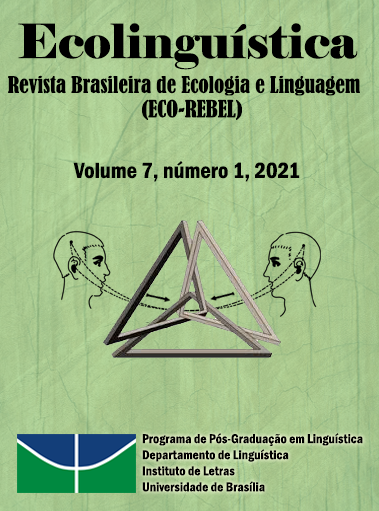Um Ecosystemic discourse Analysis (EDA)
Keywords:
Ecosysemic Discourse Analysis; ecoideology; ecological view of the worls; analysis of texts-discourses at largeAbstract
O objetivo deste artigo é apresentar a Análise do Discurso Ecossistêmica (ADE). Por ser parte da Linguística Ecossistêmica (LE), ela pode fazer uso de todas as suas categorias de análise. Mas, a ADE tem suas categorias específicas, que ficam invisíveis da perspectiva macro da LE. Para ter acesso a elas, é necessário lançar mão do método da focalização, que leva a uma aproximação microscópica, momento em que os conceitos específicos da ADE são visualizáveis. Por ter como fontes de inspiração o Ecologia Profunda, o Taoísmo e a filosofia de vida de Gandhi, e tendo como pano de fundo a visão ecológica de mundo (VEM), o praticante de ADE aborda as questões de uma perspectiva holística, que não exclui o lado político-ideológico. A ADE pode ser usada na análise de todo e qualquer tipo de texto-discurso, não apenas dos de caráter político-ideológico. Tanto que se faz a análise de um silogismo, um dos textos mais abstratos que existem. No entanto, os textos-discursos prototípicos da ADE são os que envolvem questões de vida na face da terra e que sejam de caráter dialógico.Â
Downloads
References
Alexander, Richard; Stibbe, Arran. From the analysis of ecological discourse to the ecological analysis of discourse. Language sciences v. 41, 2014, p. 104-110.
Carson, Rachel. Silent spring. Greenwich, Conn.: Fawcett Publications, 1962.
Carvalho, Isabel C. M. Territorialidades em luta: Uma análise dos discursos ecológicos. Fundação Getúlio Vargas, Dissertação de Mestrado, 1989.
xxxxxxxx
xxxxxxxxx
XXxxxxxxx
xxxxxxxxxx
DASH, Rajendra Kumar. Swachh Bharat Abhiyan and the Canadian Environment Week: Case Studies in Sustainable Development Campaigns. ECO-REBEL v. 6, n. 4, 2020. Available at: https://periodicos.unb.br/index.php/erbel/
DRENGSON, Alan; INOUE, Yuichi (eds.). The Deep Ecology Movement ”“ An introductory anthology. Berkeley: North Atlantic Books.
Fill, Alwin. Wörter zu Pflugscharen: Versuch einer Ökologie der Sprache. Viena: Böhlau, 1987.
_______. Ökologie: Eine Einführung. Tübingen: Gunter Narr Verlag, 1987.
_______. (org.). Sprachökologie und Ökolinguistik. Tübingen: Stauffenburg, 1996a.
_______. Ökologie der Linguistik ”“ Linguistik der Ökologie. In: Fill (org.), 1996a, p. 3-16.
Finke, Peter. Sprache als missing link zwischen natürlichen und kulturellen Ökosystemen. Überlegungen zur Weiterentwicklung der Sprachökologie. In: Fill (org.). 1996, p. 27-48.
Garner, Mark. Language: An ecological view. Oxford: Peter Lang, 2004.
Halliday, Michael A. K. New ways of meaning: The challenge to applied linguistics. Journal of applied linguistics 6, 1990, p. 7-36.
Harré, Rom; Brockmeier, Jens; Mühlhäusler, Peter. A study of environmental discourse. Thousand Oaks, Cal.: Sage Publications, 1999.
Haugen, Einar. The ecology of language. Stanford: Stanford University, 1972, p. 325-339.
Jacobs, George. Review of Clean meat: How growing meat without animals will revolutionize dinner and the world, by Paul Shapiro. New York, NY: Gallery Books. ECO-REBEL v. 5, n. 1, 2019a, p. 127-134. Available at:
https://periodicos.unb.br/index.php/erbel/article/view/22789/20545
Jacobs, George. Review of Ahmed Khan. Introduction to Cell Agriculture (ebook (https://cellagri.mykajabi.com/ebook ). ECO-REBEL v. 5, n. 2, 2019b, p. 119-121. Available at: https://periodicos.unb.br/index.php/erbel/article/view/27665/23802
Makkai, Adam. Ecolinguistics: ¿Toward a new **paradigm** for the science of language? Londres: Pinter Publishers, 1993.
Martin, James R. Positive discourse analysis: Solidarity and change. Revista canaria de studios ingleses n. 49, 2004, p. 179-200.
_______. Vernacular deconstruction: Undermining spin. DELTA v. 22, n. 1, 2006, p. 177-203.
XXXXXXXXX
Mühlhäusler, Peter. Language of environment, environment of language: a course in ecolinguistics. Londres: Battlebridge, 2003.
Naess, Arne. The shallow and the deep, long-range ecology movement: A summary. Inquiry 16, 1973, p. 95-100.
_______. Ecology, community and lifestyle. Cambridge: Cambridge University Press, 1989.
_______. Life's philosophy - Reason & feeling in a deeper world. Athens: The University of Georgia Press, 2002.
Privat, Edomond. Vie de Gandhi. Paris: Denoël, 1957.
Ramos, Rui. O discurso do ambiente na imprensa e na escola: Uma abordagem linguística. Lisboa: fundação Calouste Gulbenkian / Fundação para a Ciência e Tecnologia, 2009.
Russerl, Betrand. História da filosofia ocidental. Brasília: Editora da UnB, 1982.
Sapir, Edward. Language and environment. American anthropologist 14, 1912, p. 226-242.
Stibbe, Arran. Positive discourse analysis: rethinking human ecological relationships. In: Fill, Alwin; Penz, Hermine (eds.). The Routledge hanbook of ecolinguistics. New York & London: Routledge, 2018, p. 165-178.
Tansley, Arthur G. The use and abuse of vegetational concepts and terms. Ecology v. 16, n. 3, 1935, p. 284-307.
Vian Jr., Orlando. Gênero do discurso, narrativas e avaliação das mudanças sociais: A análise de discurso positiva. Cadernos de linguagem e sociedade vol. 11, n. 2, 2010, p. 78-96.
Downloads
Published
How to Cite
Issue
Section
License
Copyright (c) 2021 Ecolinguística: Revista brasileira de ecologia e linguagem (ECO-REBEL)

This work is licensed under a Creative Commons Attribution-NonCommercial-NoDerivatives 4.0 International License.
Authors who publish in this journal agree to the following terms:
Authors retain copyright and grant the journal the right of first publication. The work is simultaneously licensed under the Creative Commons Attribution License allowing the sharing of the work with acknowledgment of the authorship of the work and initial publication in this journal.
Authors are authorized to enter into additional contracts separately for non-exclusive distribution of the version of the work published in this journal (e.g., publishing in institutional repositories or as book chapters), with acknowledgment of authorship and initial publication in this journal.
Authors are allowed and encouraged to post and distribute their work online (e.g., in institutional repositories or on their personal page) at any point before or during the editorial process, as this can bring about productive revisions as well as increase impact.
Citation of published works (See The Effect of Free Access).



3.png)



